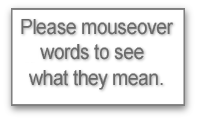James Bendle - future from the past
21-January-2010
Future from the past transcript
The aim of this expedition is to go back at least 35 million years and we're hoping to get a continuous record from the sediments back 35 million years and beyond if possible.
The reason is that 35 million years ago Antarctica was ice free. So we're really interested in the period of time when Antarctica first glaciated and how that history of glaciation has changed over the last 35 million years.
We currently have a level of greenhouse gases in the atmosphere that hasn't been seen for several million years. On current trajectories by the middle of this century we'll reach levels of greenhouse gases that haven't been seen for 30-50 million years.
Antarctica has a lot of ice, which can respond quite slowly to changing temperature. So the amount of greenhouse gases that are entering the atmosphere suggests that the atmosphere will warm by at least 2 degrees, possibly by 5 or 6 degrees Centigrade this century. That kind of temperature increase will result in the loss of mountain glaciers, and a certain amount of ice from Greenland and Antarctica.
We're setting ourselves up for big changes in the future, but the response of that ice may take centuries. We can warm the climate to the point where the ice will disappear from Antarctica. But that might take.1000 years. It won't necessarily happen in the next 50 or 100 years.
But we do want to understand for a given planetary temperature: how much ice can the Antarctic support? To do that we have to look at these different periods in the past when the planet has been at different temperatures and levels of atmospheric greenhouse gas.
A scientist doing experiments in the laboratory would set them up and vary things and see what happens. You can't do that so it's the whole of Earth's past that's your laboratory, to test ideas and hypotheses?
Yes. There is no Planet B to do experiments with. One of the things we're doing is experimenting with our atmosphere and we have an atmosphere now we haven't had for several million years and we'll have one by the end of this century we haven't had for tens of millions of years. So the logical thing to do is look into Earth's past and try to understand where we're going in the future.
More help with words
| average | conditions | orbit | planet | predictions | system | tentative |
